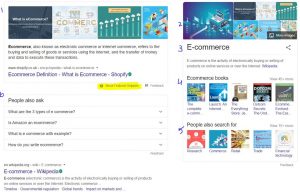Search engines now look deep into site contents and try to understand more about your site e.g. Google uses structure data to understand more about the content on your page. By providing structured data we not only can get the benefit of special features like rich snippets but also our site will be eligible to appear in graphic search results. By providing structured data you can outstand your site presence in the google search results and in result increase in clickthrough.
While searching keyword ‘eCommerce’ (from the UK, 5th of May 2020) I get the following results.
These are the highlights of the page
- Featured snippet
- Related Images
- Article
- Books
- People also searched for
- FAQ
and the rest of the search results.
Google supports structured data in the following formats JSON-LD (recommended, use this format whenever possible), Microdata, and RDFa. Google also uses schema.org vocabulary, but for definitive, google search behaviors, rely on documentation provided on developers.google.com rather schema.org.
There can be several items in your site for which structure data can be provided, e.g. article, breadcrumb, carousel, event, FAQ, logo, organization, or product. You can find examples of JSON-LD structured data code snippets from google here. A full list of vocabulary definition files can be downloaded from schama.org.
Implementation of structured data could be very simple to complex depending on your site and the way pages and blocks are structured in the EPiServer site, general structure data guidelines are available here. A reference implementation based on the schema.net package can be found in EPiServer foundation project. (Credits: Paul Gruffydd)


